Reforming society is jolly hard work—something that could well steal precious time from more enjoyable pastimes. Therefore, delegating the task of saving the world is an attractive option. Simply find some diligent, suitably inspired person, saddle them with responsibility for addressing and correcting the current existential threat, and then head off for another round of darts!
It is hard to see what could go wrong with such a flawless plan. Yet somehow, things often do go amiss. Consider these five works about reforming society.
Darker Than You Think by Jack Williamson (1948)
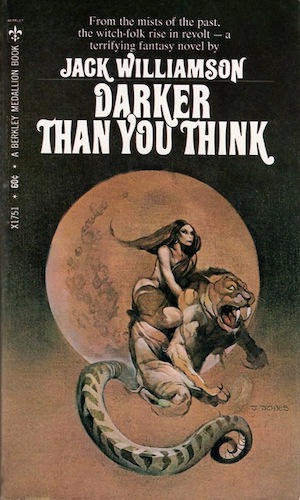
Reporter Will Barbee witnesses the sudden end of anthropologist Mondrick’s press conference; Mondrick dies in the middle of an apocalyptic rant. The secret that Mondrick was murdered to conceal is that modern humanity is the product of two closely related human species: Homo sapiens and Homo lycanthropus. H. lycanthropus is thought to be extinct but…there exists a scheme much like the scientific effort to revive aurochs, a scheme to use selective breeding to recreate H. lycanthropus.
Key to the plan: the Child of Night, a pure-blooded H. lycanthropus who will lead his people to greatness. The catch, so small as to be hardly worth mentioning, is that H. lycanthropus is obligately evil, its members the inspiration for any number of monster legends. Restoration of H. lycanthropus means the horrific oppression of H. sapiens, something Barbee should oppose…if only he were not completely besotted with one of the enemy, and himself an unwitting H. lycanthropus throwback.
There are unexpected parallels here with the revelation that many humans have Neanderthal and Denisovan genes. However, one important difference is that the shapeshifters have special quantum mechanics-based powers. Another is that they tend to either revel in malice or become its unwitting tools.
Dune Messiah by Frank Herbert (1969)
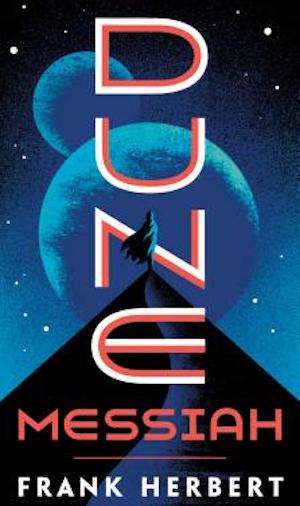
The Bene Gesserit labored for centuries to create a superbeing with a very particular constellation of traits. They succeeded beyond their wildest nightmares. Armed with prodigious prescient abilities, Paul Atreides unified Dune’s Fremen, used the Fremen to overthrow the emperor, and took his place as the natural ruler of all known humanity.
There were a number of minor catches. The Fremen are exuberant warriors with little personal experience of mercy. Over sixty billion people died as a result. Also, Paul’s prescience reveals to him a dismal future, for Paul personally and for humanity in general. What his abilities don’t show is any way for Paul to escape the trap in front of him.
Points to the Bene Gesserit for actually succeeding in their ludicrous eugenics program, but points deducted for failing to see the obvious, which is that mere mortals, even extremely smart ones like the Bene Gesserit, may not be able to foresee the consequences of creating a superhuman.
Shadow of the Swan by M.K. Wren (1981)
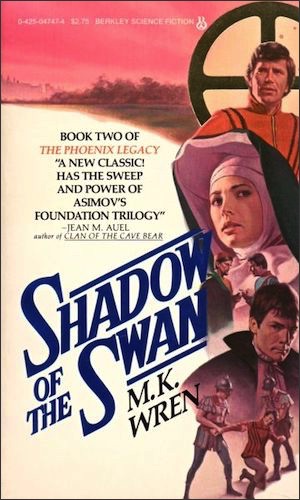
In the second book of the Phoenix Legacy series, the would-be reformers who make up the Society of the Phoenix are poised between two potential leaders: Alex DeKoven Woolf and Predis Ussher. Both claim impressive lineages. Ussher is more adept at infighting and backstabbing (useful skills for a would-be leader). Ussher, however, is power-mad (as well as being garden-variety mad, besides). Ussher’s rule would be catastrophic…but Alex may soon be too dead to prevent Ussher from prevailing.
The Phoenix is presented as a Foundation-like organization armed with powerful social models—although said models aren’t sufficiently robust to notice that one of their two possible leaders is a budding Space Hitler. One also cannot help but notice that the Phoenix don’t really want to immediately free the Bonds, on whose labor civilization depends. They just want the Bonds to abandon their periodic hopeless uprisings, and get better working conditions, healthcare, and education, and become free citizens eventually. Although the last two items might be more optional than the first.
Venus of Shadows by Pamela Sargent (1988)
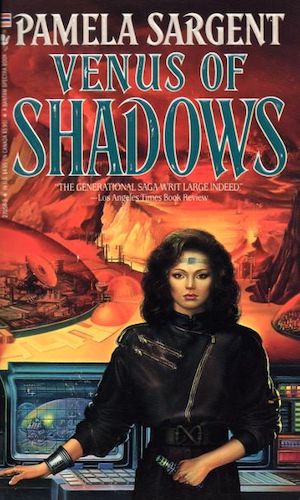
Centuries of backbreaking labor have transformed Venus from an uninhabitable hellhole to a marginally less uninhabitable hellhole on whose surface humans can survive in well-sealed domes. Hard-nosed Risa is determined to guide the Project towards its goal of a habitable Venus, adroitly outmaneuvering those who would undermine the Project for short-term goals. She overlooks the danger presented to the Project by its most ardent believers.
Risa’s blind spot is religion. Risa has no interest in the irrational and absurd Cult of Ishar. Risa’s estranged daughter Chimene not only embraces the Cult, she leads it. When a plague sweeps the colony, Chimene exploits the crisis to seize control of Venus. All will glory in the one true religion…or suffer the consequences of apostasy.
This second volume in Sargent’s Venus trilogy underlines a significant issue with epic projects such as terraforming other worlds, which is that it only takes one episode of mass mania to undermine the sophisticated and potentially fragile infrastructure on which life depends. Luckily for at least some of the characters, this is a middle book of a trilogy so a total party kill is unlikely.
Shorefall by Robert Jackson Bennett (2020)
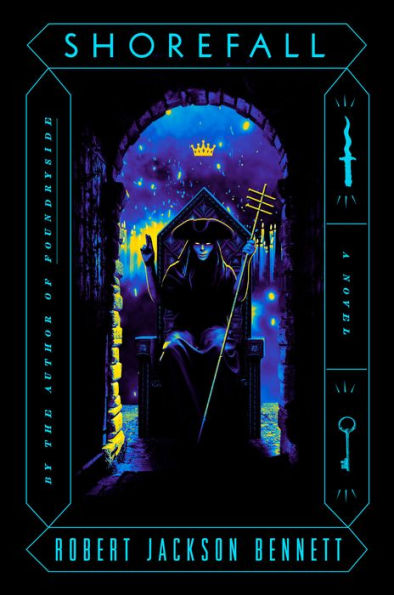
Would-be social revolutionaries Sancia, Berenice, Orso, and Gregor are determined to reform Tevanne’s horrifically exploitative society from within. Audacity and innovation have won the quartet status as a recognized merchant house. The next step is to use subterfuge to trick the established merchant houses into undermining themselves.
Ofelia Dandolo of the Dandolo merchant house also craves reform. Having no faith in incremental progress, she places all of her hopes in demi-god revolutionary Crasedes Magnus. True, Crasedes is currently dead but this is a curable medical condition. A more serious issue, one Ofelia will not grasp until it is too late, is that four thousand years of failure to save humanity from itself has embittered Crasedes. Crasedes has a bold plan to force humanity to meet his lofty expectations. He also exhibits complete indifference to collateral damage.
In Ofelia’s defense, her son Gregor and his friends have their own quasi-messianic ally whose plan differs in details but which is just as alarming as that of Crasedes. It’s almost as though investing hopes and dreams in godlike entities without doing due diligence is a bad idea…
***
No doubt there are a myriad of worthy examples that I’ve overlooked in this essay. Have a favourite example? Feel free to mention it in comments below.
In the words of fanfiction author Musty181, four-time Hugo finalist, prolific book reviewer, and perennial Darwin Award nominee James Davis Nicoll “looks like a default mii with glasses.” His work has appeared in Interzone, Publishers Weekly and Romantic Times as well as on his own websites, James Nicoll Reviews (where he is assisted by editor Karen Lofstrom and web person Adrienne L. Travis) and the 2021, 2022, and 2023 Aurora Award finalist Young People Read Old SFF (where he is assisted by web person Adrienne L. Travis). His Patreon can be found here.










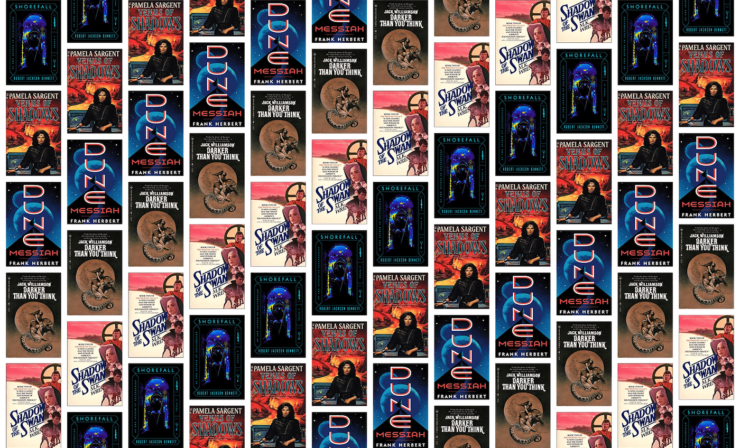
I’m currently reading Sanderson’s Well of Ascension. The Mistborn novels are rife with messiahs, from the Hero of Ages, through the Lord Ruler, to… I forget what she’s called :-) (I’ve been reading these in entirely the wrong order!)
Ada Palmer’s Terra Ignota (Too Like the Lightning, Seven Surrenders, etc.) manages to set up and follow through on this trope despite some rather audacious baiting-and-switching.
When I scanned the headline, I immediately thought, “Oh, like Stranger In a Strange Land.” The book remains a catalyst for endless argument, but it IS about a reluctant messiah and a push to change society as a whole.
James, are you feeling alright? You don’t seem to have written any footnotes.
Do you differentiate between messiahs and gods? I know Dune was terrific, and Dune Messiah was still very good, but I have actually enjoyed Herbert’s The Godmakers more. It is a concise, standalone book that is a series of stories that combine into a very satisfying story. I think the god that is made is not really a messianic one, but I am shoehorning it in here anyway because I like it so much better.
William Forstchen’s Ice Prophet which puts Dune’s plot on an icy Earth leaps to mind
To be fair to the Bene Gesserit, their plan was not followed but terminated a generation early. Then again, it isn’t as if the next generation would necessarily have been better or more pliable ( Leto and Ghanima were not exactly controllable by the Bene Gesserit either, and their planned kid, who’s effectively a child of Alia and Feyd-Rautha, is an even more chilling prospect)
@3 – same exact thought.
@@.-@ – same exact thought re the absence of footnotes, LOL.
Lord Jestocost the reconciliation of Humans and the Underpeople.
Jesus on Mars by Farmer.
Fine, have some footnotes.
1: Which I didn’t mention because the last time I read it, Abba had just won Eurovision.
2: Cthulhu worshippers: self-deluded fools or bold visionaries whose plan will transform sociey even more than NFTs?
3: I assure you, if this was still 1985, that would have been a hilariously topical zinger.
Gordon R Dickson had lots of stories with Messiah like characters.
There’s Michael Moorcock’s ambiguous Messiah, assassin, spy, and failed rock guitarist Jerry Cornelius.
There’s Julie Katz, from James Morrow’s Only Begotten Daughter.
There’s Brutha, who is at least a sorta Messiah, from Sir Terry’s Small Gods; and along similar lines, there’s (Maha)Sam(Atman) from Zelazny’s Lord of Light.
And there are Wolfe’s Severian (from The Book of the New Sun) and Silk (from the Books of the Long and Short Sun).
I was beaten to mentioned the Ice Prophet.
I would assume that Belgarion falls into the category. (More nationalist than religious, but the original concept of a Messiah was the saviour of the nation, not the saviour of the people’s souls.)
The Mule, from Asimov’s “Foundation” series.
Well, what does “science-fictional messiah” mean? Google hands me the Britannica definition of the m-word as “the expected king of the Davidic line” – there’s more, but if you’ve read the book where the character appears, you get the idea.
In science fiction, that can mean breeding or creating otherwise your superhero, or selecting them from the general population by research, or time travel to the future to find out who saves the world, then go back to your time to locate and encourage them. That sort of thing.
As explained, the science savior may or may not solve the problem for which they were obtained, and they may become a greater problem.
Depending on the identity of the savior, I could nominate Fredric Brown’s “Answer”.
Or Isaac Asimov’s “Franchise”, which, if I remember right, follows one voter considering all of the propositions on an American ballot in 2008.
If the story can include more than one person as savior, there comes to mind “Skylark” Seaton’s mission to contact the Norlaminians for assistance in defeating the invading Fenachrone – although I think it’s Seaton who does the fighting eventually.
Just finished an interesting take on this. Alaya Dawn Johnson’s Summer Prince where the society elects its Messiah who serves for a year and is then sacrificed. Highly recommend it.
I just came here to see if anyone mentioned Spock, Messiah!
Ditto to ” Stranger in a Strange Land”
17: Oddly, Spock Messiah came up in passing on my review site a few weeks ago.
@3, @7, @18
Ditto, ditto, ditto Stranger in a Strange Land
Gore Vidal’s John Cave in Messiah must be one of the earlier ones, predating Valentine Michael Smith. But instead of preaching communistic sex orgies, this JC is preaching the wonder of death. Maybe an influence of “Don’t Fear the Reaper”? The story is a thinly disguised satire on the origins of Christianity updated to a Madison Avenue advertising manipulated US in the post-World War II years.
I vaguely recall Barefoot in the Head by Brian Aldiss featuring a messiah in a Europe supersaturated with psychedelic drug aerosols. Part of the more heavily drug-influenced New Wave SF subgenre, along with John Brunner’s The Stone That Never Came Down. Those were the days.
Mallory Ringess and his son Danlo from A Requiem for Homo Sapiens by David Zindell.
Surely Karl Glogauer in Michael Moorcock’s BEHOLD THE MAN (1968) qualifies.
I’m not sure if Kyre, the Sun-Hound, from Louise Cooper’s Mirage counts, but I’m quite fond of both the character and the book.
See also the short story “Acts” by William Sanders, told from the point of view of an alien talent-agent, whose top comedian ends up being taken far too seriously when playing a small, far-off backward planet.
The presence of a book as well known as Herbert’s Dune Messiah makes the absence of Heinlein’s Stranger in a Strange Land and Zelazny’s Lord of Light stand out.
When listing messiahs we should not forget the bartender in Larry Niven’s The Fourth Profession, or the itinerant pilot in Richard Bach’s Illusions: The Adventures of a Reluctant Messiah. Both of them have professional certification, no less.
@@.-@ Agree with you about The God Makers. Interestingly, the stories that were fixed up for the novel didn’t have any of the god-making sequences in them. They were only first/second contact stories with in-fighting between bureaucracies.
I wonder if the success of Dune led Herbert to play with a variation on the theme.
@27 @@.-@ Really, pretty much every Frank Herbert book has a messiah character. I think it was a favorite theme of his (usually flawed messiahs and not a good thing for the ones they’re saving, iirc). I sometimes go on reading binges where I go after everything one author wrote, did that for Herbert in high school. Dune is by far the best, but I don’t remember disliking any of his books.
Touched by the Gods by Lawrence Watt-Evans is possibly borderline. I’ll argue that since he did save his nation (sorry for the spoiler) that he qualifies as messiah.
Not your typical messiah story (and its protagonist is a very unwilling messiah), but I’d like to mention Le Guin’s Rocannon’s World.
Not your typical messiah story (and its protagonist is a very unwilling messiah), but I’d like to mention Le Guin’s Rocannon’s World.
Another vote for Vidal’s Messiah. The title kind of gives it away.
Jommy Cross in Slan kinda fits too.
I definitely think Gordon R. Dickson’s books that are sometimes called Dorsai books but more technically referred to as the Childe cycle are about messiahs. Really sort of one cumulative messiah (and possibly one cumulative counter-messiah). In fact, this group of books may be the most in depth exploration of the whole concept to appear in SF.
One thing that definitely strikes me looking back at these books from nowadays is, they are pretty damn sexist. Except for one late side story, women are never movers of the action, never really have existence outside their relationship to the hero. But aside from that, it’s got a lot of interesting stuff, and does a weirdly good job of presenting messiah-like heroes, both in terms of their wildly incredible geniusness and in terms of meshing into, and even being created by, some kind of collective unconscious of humanity. All of them tend to have this ability to, implicitly or as the series goes on, increasingly explicitly, act in just the right way at the right time in the right place to have disproportionate impacts on the direction of history.
I read the entire trilogy containing Shorefall. The last book, Locklands, jumped way, way past the shark.
Another vote for Heinlein’s Valentine Michael Smith and Zelazny’s MahaSamAtman.
And then there’s Dan Simmons’s Aenea from Endymion and The Rise of Endymion. I really expected to see her in this list.
See also the short story “The Advent on Channel Twelve” by C.M. Kornbluth, a prescient satire on the corporate greed of multimedia franchise-holders gone one step too far.
What the intro actually made me think of was not a messiah but the Electric Monk from Dirk Gently’s Holistic Detective Agenc
A low-key version appears in Theodore Sturgeon’s Godbody
I thought Stranger in a Strange Land by Heinlein would have been the first book on this list!
Still, I get that Dune is on here, but the books I read about SF messiahs were books like Godbody by Theodore Sturgeon and Stranger in a Strange Land.
The Laundry books by Charles Stross deal with Gods (we mostly don’t want them) and if you squint, Bob could be a Messiah as long as it’s not tea time.
Also, the villain in NATURE’S END (Strieber/Kunetka) is a messiah of suicide.
Yes, both Heinlein’s Stranger… and Dan Simmons’s Endymion glaringly needed to be here
Perhaps James was discourages from including footnotes by the knowledge that the 1st few words of any footnote would be BLOCKED by that DAMNED ‘DO NOT SELL’ ICON! Ahem. Having the start of footnotes blocked by that icon is also quite annoying to any would-be reader of said footnotes. It almost makes me lose my temper.
Sati, by Christopher Pike comes to mind. Saving the world by baking cookies.